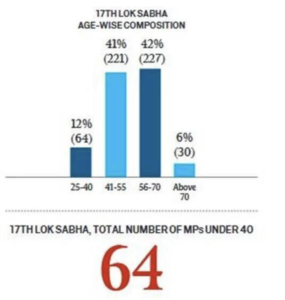Youth participation in politics has been a contentious issue in Indian politics for quite long. The recent issues of protests in JNU have brought it to the forefront once again. This article endeavours to put the ethical issues of student participation in politics and the need for youth in politics in perspective. This can be an applied ethical dimension or a question in paper 2 of Indian polity.
Dimensions
- Youth representation in Indian parliament
- Why should youth enter politics?
- Hurdles and ethical dilemmas they face in politics
- Possible solutions for youth participation in politics
Content:
Youth representation in Indian parliament:
According to the Inter Parliamentary Union (IPU), young parliamentarians are defined at age 30 or younger.
- India’s median age is 29 and the average parliamentarian is 55 for a directly elected Lok Sabha (LS) member.
- Indirectly elected Rajya Sabha members are still older, with average age being 63.

The Ministry of Parliamentary Affairs has developed a web portal on Youth Parliament, with the aim of spreading the spirit of democracy to every nook and corner of the country. The Ministry has been implementing the Youth Parliament programme since 1966 in schools, Jawahar Navodaya Vidyalayas and Universities/ colleges. So far, around 8000 educational institutions and more than 4,00,000 students have been covered under the programme.
Why should youth enter politics?
- Youth have more reason to imagine a better future and the energy to chase it.
- They have more enthusiasm, innovative ideas towards the betterment of society.
- Older politicians are probably less likely to understand the contemporary problems faced by the young people.
- By making politics accessible to the youth, the negative perceptions of politics can slowly be erased.
- Elder politicians have to prove their loyalty to their political parties by supporting their authoritarian practices but young people are at an advantage because ideas dominate their commitment.
- The involvement of youth in politics leads to civic engagement which is broader than political engagement.
Hurdles and ethical dilemmas they face in politics:
- Political parties believe that the youth, having not seen enough of life, are unprepared for the demands of top-flight politics.
- They fear that Indian electors who respect older politicians will not take young candidates seriously.
- Key party decision makers, typically veterans, do not want to yield space.
- Politicians use muscle and money power to prevent entry of good people to enter politics.
- The chances of failure are high and very few people become successful.
- General perception of a common man about a politician is someone who is deceptive and corrupt. So people from well to do fields tend to avoid themselves being listed in categories of politicians.
- Many fail to enter due to dirty politics and due to fear of harm to good image. Unethical practices have become the norm in politics.
- Nepotism plays a major role and many youth who become successful politicians belong to influential political families.
- Rising campaign spending and rotational reservation in municipal, panchayat and mayoral elections have created barriers to upward movement for aspiring young politicians.
Possible solutions for youth participation in politics:
- Considering legally-backed youth quotas which could be in the form of either seats exclusively (and rotationally) reserved for youth or a specified proportion of young candidates all registered parties contesting an election must field.
- Municipal and panchayat polls should give rise to leaders who have experience at the ground level. Such leaders, after some experience, should be able to run for state and eventually the central legislative seats.
- Promoting Inner party democracy, where in a democratic political party the various positions like president, vice-president, secretary, treasurer etc.. are filled by the election process.
The Young India Foundation (YIF), established in January 2017 is a nonpartisan national youth organization which primarily works on youth rights and their representation by recruiting and training young candidates for local level positions. It focuses on electoral politics and awareness campaigns and provides opportunities for youth representatives from different areas of India to exchange ideas and experiences and coordinate program plans. The foundation is also running a campaign to lower the age of candidacy from 25 for MPs and MLAs in India.
“No one is born a good citizen, No nation is born a democracy. Rather both are processes that continue to evolve over a lifetime. Young people must be included from birth” – Kofi Annan. Thus a right balance of young India and experienced politics could lead to the cleansing of politics and restore the public’s faith in the political system.
- What are the hurdles and ethical issues youth face to enter politics? How can the participation of youth in politics be increased?
Approach to the answer:
- Define a youth parliamentarian
- Give statistics on youth in Indian politics
- Jot down the hurdles faced by them
- Write down the solutions for increasing their participation
- Conclusion










